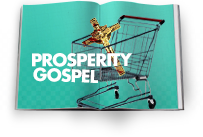A Softer Prosperity Gospel: More Common Than You Think
While evangelicals have traditionally decried the prosperity gospel in its “hard” form, there is a softer form of this teaching that is all too common among us.[1] Often undetected by Bible-believing Christians, it assumes the gospel and leads its adherents to focus on things like financial planning, diet and exercise, and strategies for self-improvement. In contrast to the hard prosperity gospel, which offers miraculous and immediate health and wealth, this softer, subtler variety challenges believers to break through to the blessed life by means of the latest pastor-prescribed technique.
Of course, matters of personal stewardship such as money, health, and leadership skills should be woven into a whole-Bible theology of Christian discipleship. The trouble comes when Christians, and especially pastors, place greater emphasis on these secondary matters. What we choose to preach or listen to says much about what we value. And what I see among some evangelicals is a willingness to prioritize the lesser matters of the law over the weightier mercies of the gospel.
This is not a new concern. Others have described facets of this prosperity gospel under names like moralistic, therapeutic deism, Christless Christianity, and the commodification of Christianity.[2] In truth, all three descriptors overlap to describe a prosperity gospel that is easily missed, because it is seems reasonable to Christians who love God and the American Dream.
A SOFTER, SUBTLER PROSPERITY GOSPEL
For those with eyes to see, signs of soft prosperity are everywhere in evangelicalism. Christian radio offers a “positive, encouraging” experience, with innumerable songs beckoning listeners to be overcomers. Christian publishers market books that help Christians look better, feel more confident, and reach their maximum potential. Likewise, Jeremiah 29:11 and Philippians 4:13 continue to be championed as mantras by Christians who want to make an impact on the world.
But of course, these examples are only symptoms, and the solution is not to demonize Christian retailers. Rather, we all must learn to think more deeply about the content of our faith and to refute the errant teachings of the soft prosperity gospel (Titus 1:9).
FIVE TRADEMARKS OF SOFT PROSPERITY
To aid in that discernment, let me outline five trademarks of soft prosperity, particularly as they show up in sermons and books.
1. Soft prosperity elevates “blessings” over the blessed God.
First, soft prosperity elevates “blessings” over the blessed God. When blessings are divorced from the triune God, compromise ensues. True blessedness resides in God alone, “the blessed and only Sovereign, the King of kings and Lord of lords” (1 Tim. 6:15). By consequence, to seek God’s blessing requires seeking him (Isa. 55:6-7; Matt. 6:33). Christ is the true treasure (Matt. 13:44-46), and any pursuit of blessing that makes God a means to another end is erroneous and idolatrous.
2. Soft prosperity detaches verses from the redemptive framework of the Bible.
Second, soft prosperity detaches verses from the redemptive framework of the Bible. When preachers present isolated verses as time-honored principles for claiming God’s blessings, a counterfeit gospel results. Instead of relating all blessings to Christ, they directly apply individual verses to people today.
Such a promise motivates the strong and extinguishes the weak. Unless a passage is rightly related to redemptive framework of the Bible, verses like Psalm 1:3 become treadmills on which earnest Christians tire themselves out. Genuine Christ-centered expositional preaching prevents this sort of textual manipulation, and guards against the gospel of soft prosperity.
More specifically, soft prosperity delights in the tangible promises of the Old Testament.[3] The error is often found in promising old covenant blessings to new covenant saints. Whenever we read the Old Testament, faithful interpreters must see how the promises first related to Israel in their historic and theocratic state; second, to Jesus who perfectly fulfilled the law (Matt. 5:17); and third, to us. Because we live under the new covenant, there will always be continuity and discontinuity between the Old Testament promise and its contemporary fulfillment. Preachers must learn how to interpret these ancient texts at the textual, epochal, and canonical levels.[4] Likewise, healthy churches must learn to see how every blessing is found in relationship to Jesus Christ, the mediator of the new covenant.
3. Soft prosperity diminishes the curse that Christ bore and the blessing of the Holy Spirit.
Third, soft prosperity diminishes the curse that Christ bore and the blessing of the Holy Spirit. In the Bible, blessedness is not an amorphous idea. Deuteronomy 27-28 specifies the content of the Mosaic covenant’s blessings and curses. Quoting these verses, soft prosperity preachers advertise divine blessings through greater obedience, but they ignore the fine print. Only one man has so perfectly obeyed God’s so as to merit God’s blessing (Heb. 10:5-10). And for Jesus’ covenantal obedience, he was sentenced to death on a Roman cross, accursed for the sins of his people (Gal. 3:10-13).
Perhaps the greatest problem with the soft prosperity is the way it assumes the cross of Christ, instead of adoring the Blessed One who bore the wrath of God in our place (Gal. 3:13). Soft prosperity preachers speak often about what you can do to experience God’s favor, but they rush past the cross, missing the fact that every spiritual gift has been secured for the believer by Jesus, who gives us his Spirit as the preeminent blessing (Gal. 3:14; Eph. 1:3). Although they don’t deny the Romans Road, they are driving on another highway.
4. Soft prosperity relies on pastor-prescribed therapeutic techniques.
Fourth, soft prosperity relies on pastor-prescribed therapeutic techniques. By assuming the gospel, soft prosperity preachers fill the vacuum with a full plate of therapeutic techniques. With the language of Zion, they emphasize the good works of the believer. Although not explicitly denying salvation by grace through faith, pastors who repeatedly insist on life tips, techniques, and strategies for saintly success undermine the faith once for all delivered to the saints.
5. Soft prosperity largely addresses first world, middle class problems.
While the previous four trademarks could in many ways apply to hard or soft prosperity preaching, one striking difference remains. Whereas hard prosperity preaching invites followers to name it and claim it, soft prosperity preachers inspire the upwardly mobile to reach for their dreams. In the former good health and a strong portfolio prove God’s tangible salvation; in the latter preachers proclaim a religion of therapeutic solutions. To quote only one of their teachers: “Do I believe in supernatural return on giving? Yes, sir! Do I believe God blesses tithes and offerings? Yes, I do. But why should we teach you to claim a car without teaching you about the car payment and interest rates on loans.”[5]
In a nutshell, T. D. Jakes’ message promises the same gold, through a different line of credit—superabundant faith mixed with well-ordered works. In short, this softer prosperity preaching appeals to first world, middle class people who are too busy living to examine a message that reaffirms their natural aspirations for success. Tragically, “believers” who buy into this false gospel may remain ignorant of their greatest need—atonement for sin before a holy God—unless confronted with true gospel of Jesus Christ.
A BETTER THEOLOGY OF BLESSING
In the end, the tragedy of the soft prosperity gospel is the way it focuses so much on earthly improvements. By offering Christians their best life now, the eternal realities of heaven and hell are lost. This brings the very real possibility that many who hear the soft prosperity gospel are and will remain lost.
In response, Christians must learn to recognize the error of soft prosperity. And we—especially pastors—must prayerfully work to liberate others from it. First we must confess the ways that desires for earthly success have latched on to our own hearts. Second, we must present the biblical gospel, which far exceeds the offer of saintly success. We must extol the riches of the true gospel and trust that when God’s sheep hear his call to repent of their sin and cling to Christ, they too will sell their soft prosperity and receive as a free gift the only treasure that counts—Jesus Christ, the only blessed king.
[1] On the difference between hard and soft prosperity gospels, see Kate Bowler’s revealing study, Blessed: A History of the American Prosperity Gospel (New York: Oxford University Press, 2013), 78.
[2] In order, Christian Smith with Melinda Lundquist Denton, Soul Searching: The Religious and Spiritual Lives of American Teenagers (New York: Oxford University Press, 2006); Michael Horton, Christless Christianity: The Alternative Gospel of the American Church (Grand Rapids: Baker, 2008), esp. 65-100; Stephen J. Nichols, Jesus Made in America: A Cultural History from the Puritans to The Passion of the Christ (Downers Grove, IL: IVP Academic, 2008), esp. 173-97.
[3] See a list of such verses in Michael Schäfer’s article, “The Prosperity Gospel and Biblical Theology.”
[4] For a helpful treatment of this approach, see Edmund Clowney, Preaching and Biblical Theology (Phillipsburg, NJ: P & R, 1979).
[5] Cited in Bowler, Blessed, 119.









